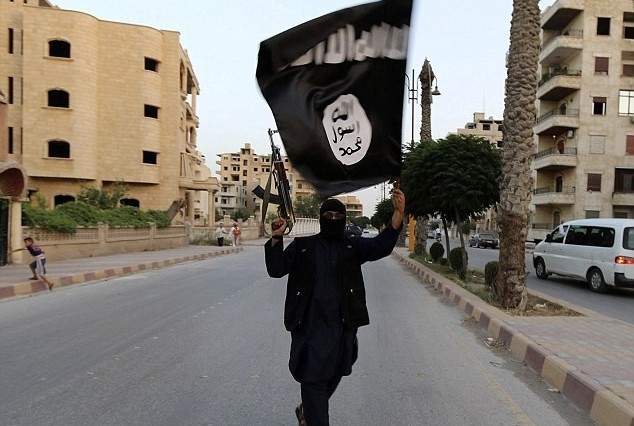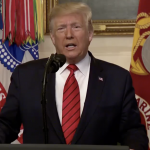by Emile Nakhleh
Millions of words have been written about the rise, conquests, and savagery of the Islamic State (ISIS) in Iraq and Syria, and Boko Haram in Nigeria. Both have declared an “Islamic State” in their areas although Boko Haram has not claimed the mantle of a successor to the Prophet Muhammad as ISIS leader Abu Bakr al-Baghdadi has in Greater Syria. The two groups are the latest in a string of terrorist organizations in the past two decades.
American and other Western media have raised the ISIS terror threat to unprecedented levels, and the press have extolled the group’s military prowess, financial acumen, and command of social media propaganda.
The beheadings of American journalists James Foley and Steven Sotloff are the latest horrible manifestations of the group’s brutality. ISIS is now seen as a serious threat to the American and British homelands and new measures are being taken in both countries to combat the dangers it poses.
Although surprised at the rapid growth of ISIS, Western policymakers should not be bewildered by the rise of yet another terrorist group. In the past 20 years, the world has witnessed the emergence of al-Qaeda as a global jihadist group, Jama’a Islamiyya in Southeast Asia, al-Qaeda in the Arabian Peninsula, al-Qaeda in North Africa, al-Qaeda in Iraq, Boko Haram in Nigeria, the Islamic Fighting Group in Libya, al-Shabab in Somalia, the Taliban in Afghanistan and Pakistan, and a few more localized bands of terrorists across the greater Middle East.
In every case, Western countries described the groups as a “gathering threat” and mobilized friendly countries, including autocratic rulers, against the perceived dangers.
Policy and intelligence analysts spent untold hours and traveled thousands of miles tracking the movements of these groups and their leaders and writing briefs and reports about the nature of the threat.
Most of these analytic reports have focused on “current” issues. Only a meager effort has been expended on long-term strategic analysis of the context of radical and terrorist groups and their root causes. It’s as if we are doomed to fight yesterday’s wars with no time to look into the context that gives rise to these groups. President Barack Obama’s recent statement that his administration had no strategy to fight the ISIS menace in Syria epitomizes this analytical paralysis.
Regional Problem
ISIS is primarily a threat to Arab countries, not to the United States and other Western countries. The more Sunni Arab states remain silent in the face of this pseudo-religious vulgarity, the sooner terrorism would be at their door. Arab society under the yoke of extremist Islamism must be addressed from within the region, not by American airstrikes or Western military intervention.
If the Islamic State expands beyond the Levant, it will plunge Arab societies into militancy, bloody conflicts, and depravity devoid of free thought, creativity, and economic prosperity.
The threat that Western societies could potentially face would come not from ISIS but from the hundreds of their young citizens who joined ISIS. These young jihadists, who hail from the US, Canada, Britain, France, Italy, Australia, and other countries, have joined ISIS either as “walk-in” volunteers or as a result of ISIS’ sophisticated social media recruiting campaign. They left their seemingly comfortable lives for all kinds of political, psychological, religious, or ideological reasons to fight for a “cause” they are not terribly clear about.
If they survive the fighting, they would return home having been brainwashed against the perceived decadence of Western Christian societies and the imagined “purity” of their faith. Their imported emotional contradictions would drive some of them to relive their jihadist experience in the Levant by committing acts of violence and terrorism against their fellow citizens.
The so-called caliphate, whether in the Levant or West Africa, is a backward perversion of Sunni Islam that opposes modernity in all of its manifestations—interfaith dialogue, women’s education, minority rights, tolerance, and reason. A self-proclaimed successor to the Prophet Muhammad, al-Baghdadi’s Islamic State in the Syrian Desert is violating every principle of Muhammad’s Islamic State in Medina in the 7th century.
Some Bush-era neoconservatives and Republican hawks in the Senate who are clamoring for US military intervention in Syria seem to have forgotten the lessons they should have learned from their disastrous invasion of Iraq over a decade ago. Military action cannot save a society when it’s regressing on a warped trajectory of the Divine—ISIS’ proclaimed goal.
As long as Arab governments are repressive, illegitimate, sectarian, and incompetent, they will be unable to halt the ISIS offensive. In fact, many of these regimes have themselves to blame for the appeal of ISIS. They have cynically exploited religious sectarianism to stay in power.
If it is true that a young man is not radicalized and does not become a terrorist overnight and if it is true that a terrorist group does not develop in a vacuum, then it’s time to stand back and take a strategic look at the factors that drive ISIS and similar Sunni terrorist groups in the Arab world.
1. Intolerant Doctrine. Some Arab Sunni regimes, including Saudi Arabia and Bahrain, continue to preach an intolerant religious Sunni ideology that denigrates not only other faiths but also Shia Islam. Christian religious places and educational institutions cannot operate freely in places like Saudi Arabia.
Much of the anger that has characterized the Islamization of Muslim societies in recent years has been directed against these institutions. This type of harassment is felt across the region, from Palestine to Saudi Arabia. What makes this reality especially sad is the fact that Christian institutions have been at the forefront of Arab educational renaissance since the 19th century.
The Sunni regimes’ benign neglect of the rapidly spreading Sunni violent ideology and its divisive sectarian policies has allowed ISIS to spread. This does not augur well for its survival. The Saudi brand of intolerant, narrow-minded Wahhabi-Salafi Sunni Islam is not much different from al-Baghdadi’s modern day caliphate.
The Saudis oppose ISIS because of its perceived threat to the regime, but they cannot disavow their theological worldview, which rejects Shia Islam, Christianity, and Judaism and denies women their rightful place as equal citizens. The rapidly spreading ISIS doctrine is making it a bit late for the Saudis and other Sunni regimes to act. Nor will the West be able to bail them out.
2. Arab Autocracy. Sunni Arab dictators have refused their peoples freedoms of speech, organization, political activism, innovation, and creativity. The three “deficits” of freedom, education, and women’s rights that Arab intellectuals identified in the Arab Human Development Report in 2002 are yet to be meaningfully addressed.
Politics is controlled by the powerful with no room for reason or compromise among the different stakeholders and centers of power in society. Those on top commit all kinds of dastardly deeds to stay in power, and those at the bottom are doomed to remain stuck in the proverbial “bottom one billion.” Regimes do not allow the meaningful separation of powers, checks and balances, and independent judiciaries to properly function. Control, fear, and co-optation remain the preferred tools of Arab dictators.
3. Hypocrisy of “Values.” President Obama has often invoked American values of liberty, human rights, equality, justice, and fairness as the underpinnings of American democracy and of “what makes us who we are.” Yet when Arab publics see Washington steadfastly supporting Arab dictators, who are the antithesis of American “values,” the United States comes across as hypocritical and untrustworthy.
The debates within Islam over whether the faith should return to its 7th century roots, as ISIS’s ruthlessness has shown, or leap into the 21st century modern world, as Turkey has demonstrated, should primarily concern Muslims. They and they alone are the ones to resolve this quandary. ISIS is a violent symptom of this tug of war between intolerant traditionalists and forward-looking reformists. The West should stay out of the debate.
Western security and law enforcement agencies should focus on their own citizens and track their would-be jihadists, but Western military aircraft should stay out of the skies of the Levant.





The central operating principle in all of the situations outlined is the use of Islam as the tool by which these groups operate. Whether they are just gangs of thugs that drape themselves in so-called Islamic justice to hide their rampages or true believers that believe in a righteous war against either the West or other Muslim sects, the lever by which these mountains are being moved is the near constant struggle within Islam. It is remarkable how violent, destructive and ever present these groups are and how many nations in the Middle East such as Iran and Saudi Arabia manipulate them like so many chess pieces in a remarkable reconstruction of the Cold War power politics practiced by the US and the old Soviet Union. What never changes is the thirst and hunger for brutal men in power to maintain their grip on that power and crush any dissent. The core issues are even more basic than religion and politics, it’s the abject nature of men who are power hungry and corrupt and it is a rule that can be applied to imans, presidents, militants, businessmen and even journalists.
I wish the author would square his previous advocacy of assisting the moderate Syrian forces (including, I believe, limited air strikes against the butcher of Damascus) with his caution here against military action. His previous writings on this site put him awkwardly close to the neo-conservative camp. Has he disavowed this strategy? Or has he, like Shadi Hamid of the Brookings Doha center become more pessimistic about its likelihood of success given the failure to act earlier? Or something else?
Labeling is a speciality of the West and they find complacency in repeating these labels in order to feel self righteous.
The successive US leaders after having killed millions in Iraq and helped killing almost 40,000 Syrians soldiers and as much Syrian civilians are taking their summer vacation in Martha’s vineyard.
They feel contented that nobody has the guts to tell them in their face they are the real butchers.
People talk of narrow, hardline interpretation of Islam as the reason for these problems. That interpretation is the only real one because that’s what there is in the book, largely. What is the use blaming the jihadists for trying to enforce the rest to follow the rulings in the book, literally. To them, the “other” interpretations deviate from the Islam in the book. They are right about that part.
The behaviour exhibited by islamists in lands they brought under their control is common since the time Islam broke out of the desert where it was born. The beheadings, the forcible conversions have long precedents, supported by stories of the founders own escapades.. Even in those centuries old conquests of kaffir lands the islamists were inspired by sections of the book that ruled on what the “warriors” should do to native polulations.
It is the book. The Sunni states will not deviate from the book. To do so would be turning their back on the teachings of Islam. Read the book. You will get it.
Are you sure you are not confusing modernist takfiri fundamentalism, drawing upon Wahhabist extremism, with the original alleged teachings of Mohamed?
If what you suggest is true, then there should not have been one single non-Muslim in any of the Muslim countries anywhere in the world – yet we all know this is not the case.
Your explanation for this apparent difference in terms of facts is…………………………..?